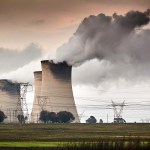DOCTORS’ ORDERS
Scientists, academics and healthcare professionals prescribe ‘fossil fuel non-proliferation treaty’ for a healthier world

A Nobel Peace Prize laureate, leading academics and the head of the planet’s foremost public health agency met hundreds of health professionals and organisations from across the globe on Wednesday. They are calling for an end to global dependence on fossil fuels to protect people’s health.
‘The modern addiction to fossil fuels is not just an act of environmental vandalism. From the health perspective, it is an act of self-sabotage.”
These were the words of Dr Tedros Adhanom Ghebreyesus, Director-General of the World Health Organization (WHO), in a statement affirming his support for a plan outlined in an open letter signed by more than 1,000 health professionals and 200 health organisations across the globe on Wednesday.

Director-General of the World Health Organization Tedros Adhanom Ghebreyesus. (Photo: EPA-EFE / Martial Trezzini)
Among the signatories to the letter are global health heavyweights like the World Medical Association, the Alliance of Nurses for a Healthy Environment, the World Federation of Public Health Associations and the WHO.
The letter calls on governments to urgently develop and implement what the signatories are calling a “Fossil Fuel Non-Proliferation Treaty” — a legally binding international pact to “end global dependence on fossil fuels” and “protect the health of people around the world”.
Visit Daily Maverick’s home page for more news, analysis and investigations
The United Nations defines a treaty as an “instrument” comprised of four criteria. First, it needs to be a “binding instrument”, which means the “contracting parties intend to create legal rights and duties”. Second, the instrument “must be concluded by states or international organisations with treaty-making power”, and third, the instrument needs to be governed by international law. Fourth, it needs to be in writing.
The mooted Fossil Fuel Non-Proliferation Treaty finds inspiration in the WHO’s Framework Convention on Tobacco Control. The framework, which was the first international treaty negotiated under the auspices of the WHO, was developed in response to the “globalisation of the tobacco epidemic” and is an “evidence-based treaty that reaffirms the right of all people to the highest standard of health”, according to the UN.
In a similar vein, the proposed treaty would be an “evidence-based international agreement to control a category of substances well-known to be harmful to human health: coal, oil and gas.”
The letter lays out several threats fossil fuels pose to planetary and human health:
- Air pollution, most significantly from burning fossil fuels, causes more than seven million premature deaths each year and contributes to cardiovascular disease, respiratory conditions and cancers. Wildfires, made increasingly intense and common by climate change, add to this burden.
- The warming climate creates ideal conditions for the transmission of food and water-borne diseases and spread of vector-borne diseases, undermining decades of progress in global public health.
- Climate change increases the risk of heat-related illness and death, especially for very young children, outdoor workers, athletes, and older adults.
- Droughts, floods, extreme weather events and sea level rise caused by climate change disrupt livelihoods, pollute water, jeopardise food security, damage infrastructure and force migration, especially for populations living on small islands, coastal regions and low-lying areas.
- Extreme weather events disrupt global medical supply chains and devastate healthcare facilities, severely impacting on health workers’ ability to provide healthcare.
- Climate change is taking a serious toll on mental health, exacerbating anxiety and depression, especially in young people.
Sir Andy Haines, professor of Environmental Change and Public Health at the London School of Hygiene and Tropical Medicine, said in a statement that “rapid progress towards net zero emissions is essential to protect health in the face of escalating impacts of climate change. The Fossil Fuel Non-Proliferation Treaty has great potential to accelerate the pace and scale of climate action for health”.
“We know that emissions have to be slashed to limit warming to safe levels; we know fossil fuels are the greatest driver of emissions, and we know that phasing out fossil fuels is the only way to reap many of the health co-benefits of climate mitigation — so why then are governments permitting new drilling, new mining and new pipelines?” asked Dr Liz Hanna, the Chair for Environmental Health of the World Federation of Public Health Associations.
“The science on this is clear: new fossil fuel development is completely incompatible with a healthy climate and a healthy future.”
Read more in Daily Maverick: “Fossil fuels: Humanity digging its own grave, UN secretary-general tells world leaders”
Dr Ira Helfand, immediate past president at International Physicians for the Prevention of Nuclear War, and the recipient of the 1985 Nobel Peace Prize, said “the two overriding issues of our era — the climate crisis and the danger of nuclear war — are deeply intertwined.
“The climate crisis is leading to greater international conflict and a growing risk of nuclear war, and nuclear war will cause catastrophic, abrupt climate disruption. The world must come together to prevent both of these existential threats,” said Helfand.
Regarding the necessity of the proposed treaty, Dr Jeni Miller, Executive Director of the Global Climate and Health Alliance, said: “It’s plain to see why we need a Fossil Fuel Non-Proliferation Treaty: fossil fuels are not just toxic to people’s health — every stage of the fossil fuel cycle puts people’s health at risk… from mining and fracking to transport through pipelines, to processing, and finally to burning fossil fuels for transport, electricity and industrial use.
Alternatives
“For decades we’ve depended on the capacity of fossil fuels to provide energy, but we now have alternatives that are cleaner and more sustainable — and compatible with the healthier future we want.
“Access to clean energy is vital for lifting people out of poverty, supporting economic development, delivering education and healthcare, and many other determinants of health. Clean energy alternatives to burning fossil fuels exist, but many countries do not have the means and technical expertise to make the transition.”
Miller said “high income countries have benefited from the last hundred-plus years of fossil fuel use. These countries have the resources and moral responsibility not only to make the clean energy transition, but to support developing countries to do the same, so that we can phase out poverty and health inequities while ending dependency on fossil fuels.”
Read more in Daily Maverick: “Pioneering study attributes $6-trillion in global warming-related economic losses to USA, China and others”
“Air pollution kills over seven million people a year worldwide, while over 90% of people in the world live in places that exceed World Health Organisation limits for air pollution. Phasing out fossil fuels would prevent 3.6 million air pollution deaths per year — an immense near-term health benefit to achieve the steps essential to mitigating climate change in the long term,” said Miller.
Diana Picon Manyari, international climate director of Health Care Without Harm, said “fossil fuels are a key driver of climate change and pollution — affecting people worldwide, but most insidiously vulnerable populations and low- and middle-income countries that suffer from higher exposure.
“The phase-out of fossil fuels is the single most important public health intervention we can achieve.”
Premature deaths
South Africa’s Dr Lwando Maki, a public medicine specialist and internal medicine doctor, said “the impact of fossil fuels on health is increasing, with millions of families losing their father, mother, sister, brother, son or daughter prematurely… There is a need for governments globally to look at putting plans to address the use of fossil fuels; these plans will factor in development and economy, but there must be an end point — no one wants to lose their family due to the impact of fossil fuels.”
Dr Poornima Prabhakaran, director of the Centre for Environmental Health at the Public Health Foundation of India, in a statement described “a just, healthy and rapid transition away from fossil fuels to cleaner, more sustainable energy sources” as being imperative both for human and planetary health.
“The entire life cycle of fossil fuels — from mining, fracking, combustion and disposal of end products — is fraught with health hazards. A fossil fuel non-proliferation treaty will provide critical and timely impetus to our efforts to address air pollution and the climate crisis.
“Safeguarding the lives and livelihoods of communities involved in coal mining must also receive due attention.”
Read more in Daily Maverick: “Activists call coal mine fire emissions ‘a major health concern that cannot be underestimated’ ”
Laalitha Surapaneni, a practising internal medicine physician and national board member of Physicians for Social Responsibility, said that “as health professionals, we are struggling to protect the health of our communities from the impacts of climate change already here.
“Leaving fossil fuels in the ground, where they belong, is a common sense public health measure.
“A rapid, just transition away from fossil fuels is an investment in health equity. For my patients, clean air is medicine, and the Fossil Fuel Non-Proliferation Treaty, the prescription.” OBP/DM



















 Become an Insider
Become an Insider
Comments - Please login in order to comment.